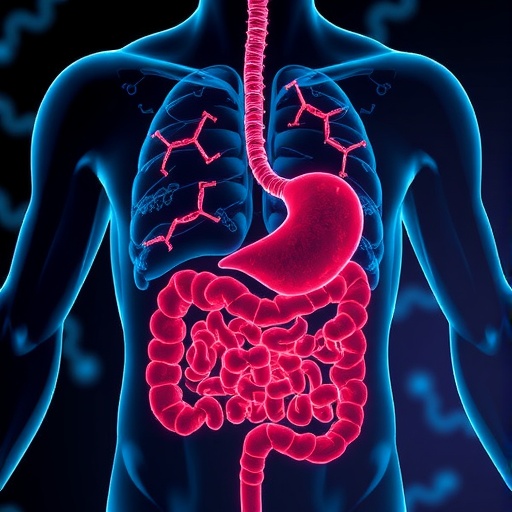In an intriguing development within translational medicine, researchers have unveiled significant insights into the complex relationship between host stress proteins and hemorrhagic shock, emphasizing the intricate role played by gut microbiota. The study led by Deng et al. represents a substantial contribution to our understanding of how biological systems respond to extreme physiological stressors. It begins to unravel how our microbial companions might influence serious health outcomes, particularly in scenarios of acute blood loss or trauma.
Hemorrhagic shock arises from a substantial loss of blood volume, typically resulting in a critical reduction in perfusion and oxygen delivery to vital organs. This scenario poses a medical emergency and can lead to multiple organ dysfunction and, ultimately, death if not addressed rapidly and effectively. The investigation centers around the hypothesis that stress proteins secreted by the host can modulate the body’s response to such drastic reductions in blood volume. These proteins interact with the gut microbiota, which serve as both mediators and modulators of the inflammatory response during hemorrhagic episodes.
The research employed a robust methodology, including Mendelian randomization alongside animal models, to support their findings. Mendelian randomization provides a unique framework to infer causality in observational studies by leveraging genetic variants as instrumental variables. This approach mitigates confounding and reverse causation, allowing the authors to draw stronger conclusions regarding the relationship between stress proteins, gut microbiota composition, and physiological responses during hemorrhagic shock.
One of the key findings from the study is that specific host-derived stress proteins can significantly alter the composition of gut microbiota. This alteration is pivotal; certain microbial populations were identified as being beneficial in regulating inflammation and promoting recovery during and after hemorrhagic shock. This correlation highlights the importance of considering the gut microbiome as an essential player in health and disease, particularly under conditions of acute physiological stress.
Furthermore, the researchers observed that the beneficial effects of certain gut microbes may be linked to their ability to produce short-chain fatty acids, which are important for maintaining gut health and preventing excessive inflammation. These molecules help modulate the immune response, indicating that the microbiota’s health can directly influence how well an individual copes with severe stress events like traumatic blood loss.
The animal models utilized in the study provided compassionate insights into the mechanisms at play. By manipulating the levels of identified stress proteins and observing changes in microbial communities, the researchers could trace the pathway from host response to microbial modulation and ultimately to tissue response during hemorrhagic shock.
Moreover, this study raises compelling questions regarding potential therapeutic interventions. If certain stress proteins can be harnessed or modulated, it might be possible to enhance gut microbiota resilience in patients who are at risk for severe hemorrhagic events. This opens the door for innovative strategies that could improve outcomes for these individuals by tuning their microbiota in a way that enhances their physiological resilience during critical traumas.
The implications of this research extend beyond immediate clinical applications. It encourages a more holistic view of health maintenance, where gut health—and by extension, microbiota composition—is seen as integral to physical resilience. The intersection of stress pathways, immune response, and gut microbial health encapsulates a vital area of exploration that could transform how we approach both prevention and treatment of hemorrhagic shock and similar critical conditions.
Additionally, the findings invite further exploration into the role of lifestyle factors that influence gut microbiota. Diet, for instance, plays a vital role in shaping these microbial communities, and understanding this connection could lead to dietary recommendations tailored for individuals containing certain genetic predispositions to suboptimal stress responses.
While the current findings are a step forward, they also delineate a vast landscape of future research opportunities. Investigating the broader implications of host stress proteins in various disease contexts, such as sepsis or ischemic injuries, could yield further insights into the underlying mechanics of inflammation and recovery.
As the field progresses, it becomes evident that a multidimensional approach to research—including genomics, microbiomics, and host response—will be crucial in addressing the complexities of human health. Such cooperative perspectives offer the potential for breakthroughs that align our understanding of the body’s systems with innovative medical therapies and interventions, laying down the groundwork for a new frontier in medical science.
The ongoing conversation within the scientific community about the relationships between stress, gut health, and systemic responses will likely shape future studies. It is crucial to appreciate not only how these elements interact but also how modulating one aspect could maintain or enhance overall health, particularly among vulnerable populations facing acute stresses.
In conclusion, the work presented by Deng et al. serves as a keystone study that combines molecular biology, microbiome research, and clinical implications. As we continue to learn more, the pathways connecting stress proteins to gut microbiota offer a captivating glimpse into the body’s intricate connections and the potential for therapeutic advancements in trauma care and beyond.
Subject of Research: The relationship between host stress proteins, gut microbiota, and hemorrhagic shock.
Article Title: Host stress proteins shape hemorrhagic shock via gut microbiota: evidence from Mendelian randomization and animal models.
Article References: Deng, G., Wu, L., Xiong, S. et al. Host stress proteins shape hemorrhagic shock via gut microbiota: evidence from Mendelian randomization and animal models. J Transl Med 23, 1324 (2025). https://doi.org/10.1186/s12967-025-07364-8
Image Credits: AI Generated
DOI: https://doi.org/10.1186/s12967-025-07364-8
Keywords: Host stress proteins, hemorrhagic shock, gut microbiota, Mendelian randomization, inflammation, short-chain fatty acids, animal models, trauma care.




